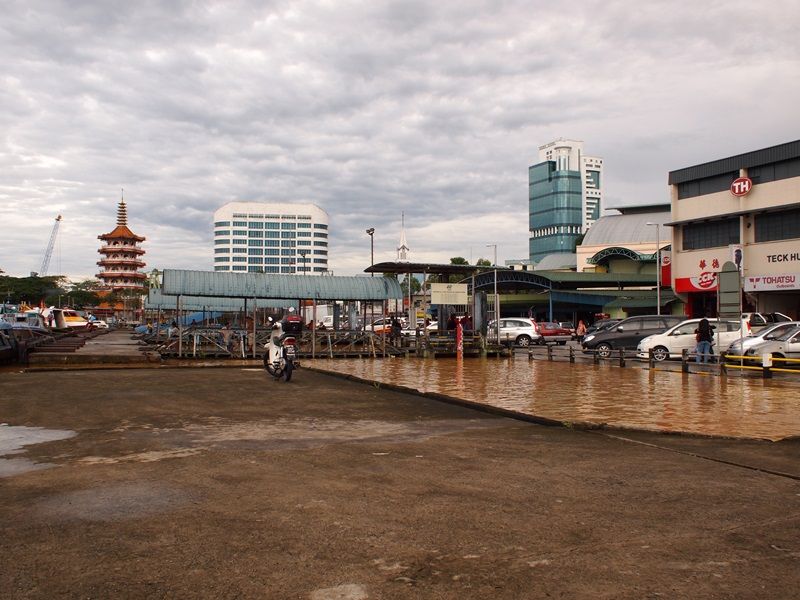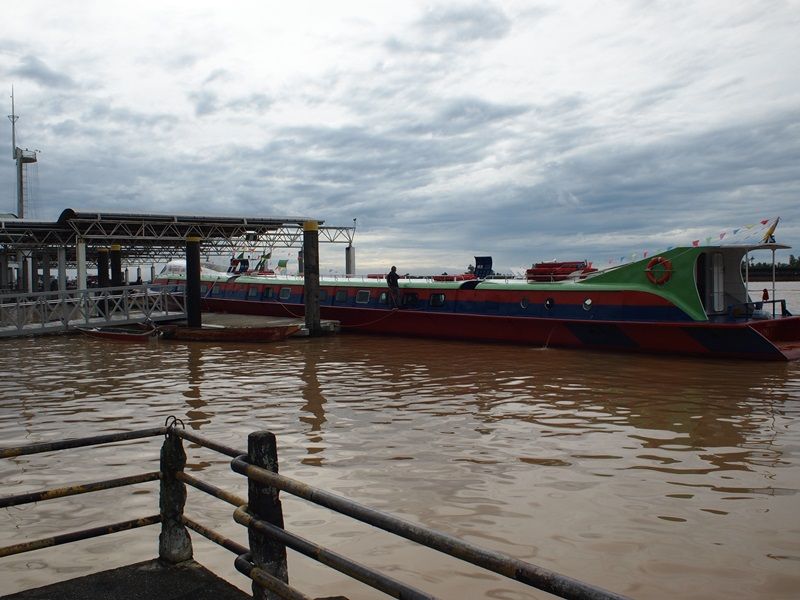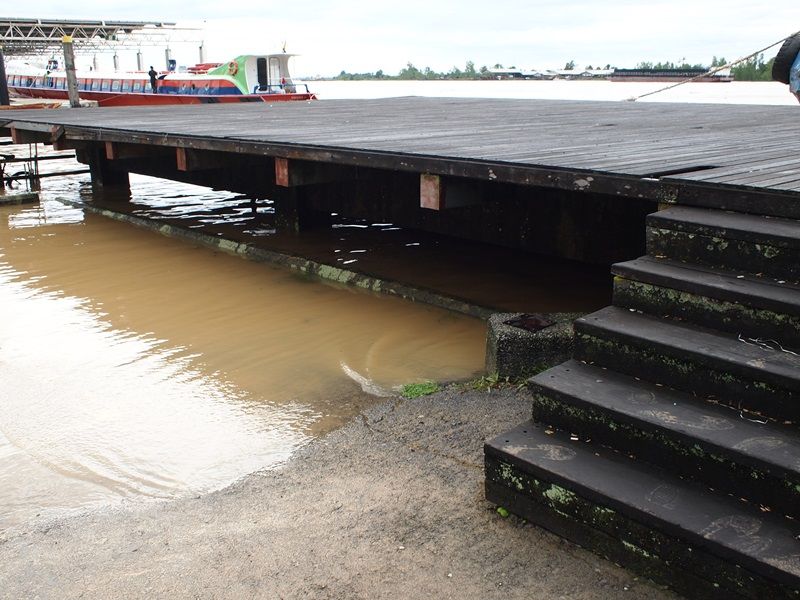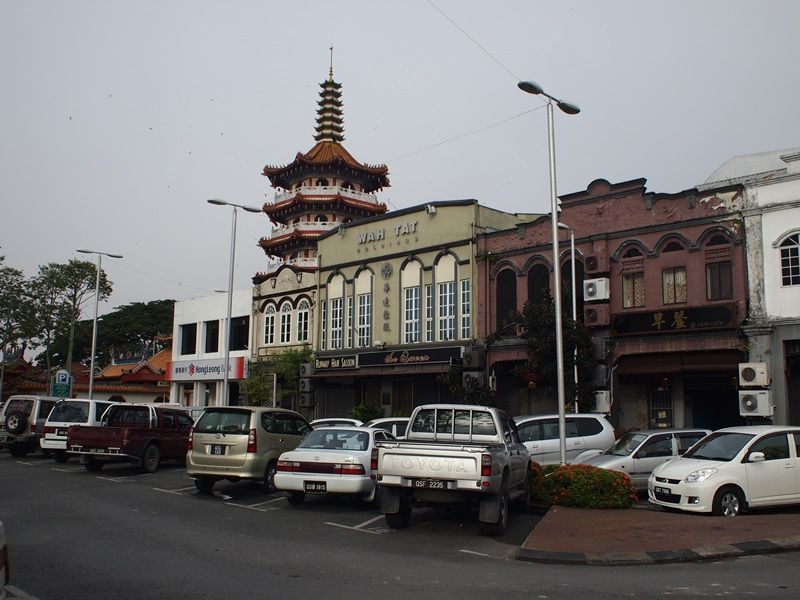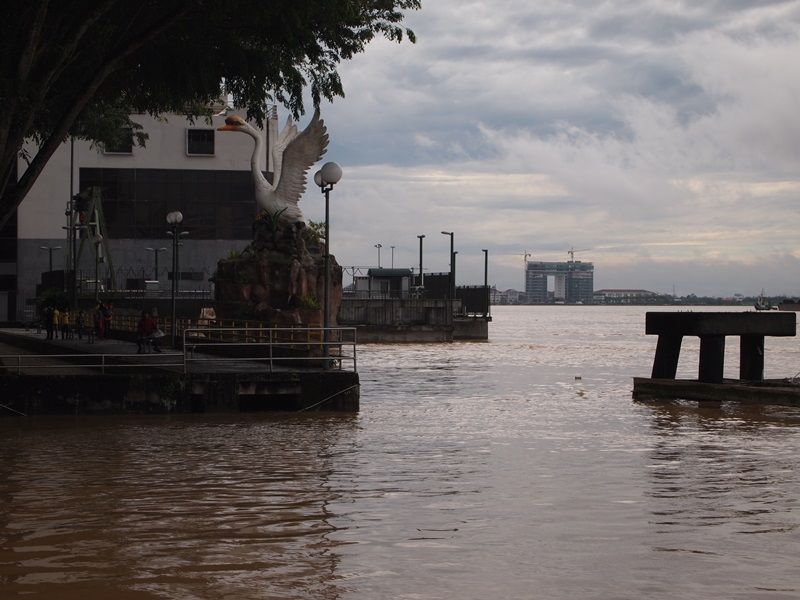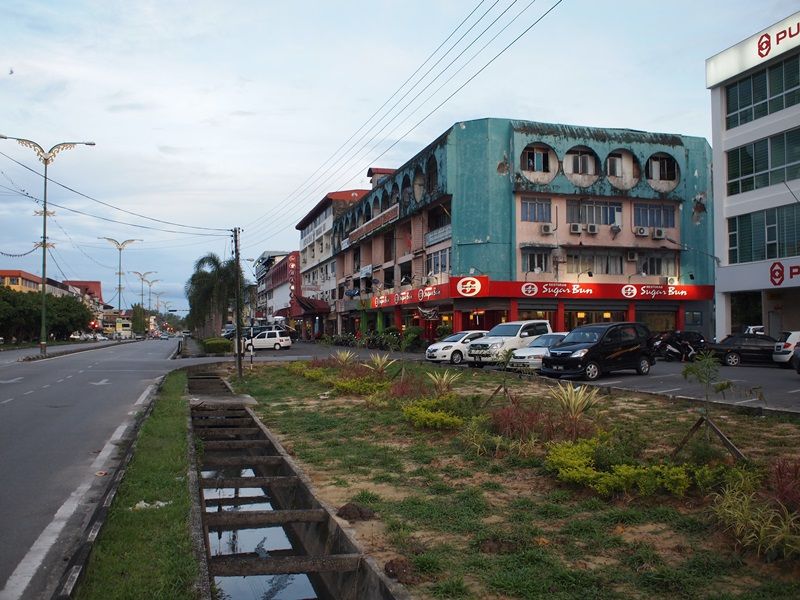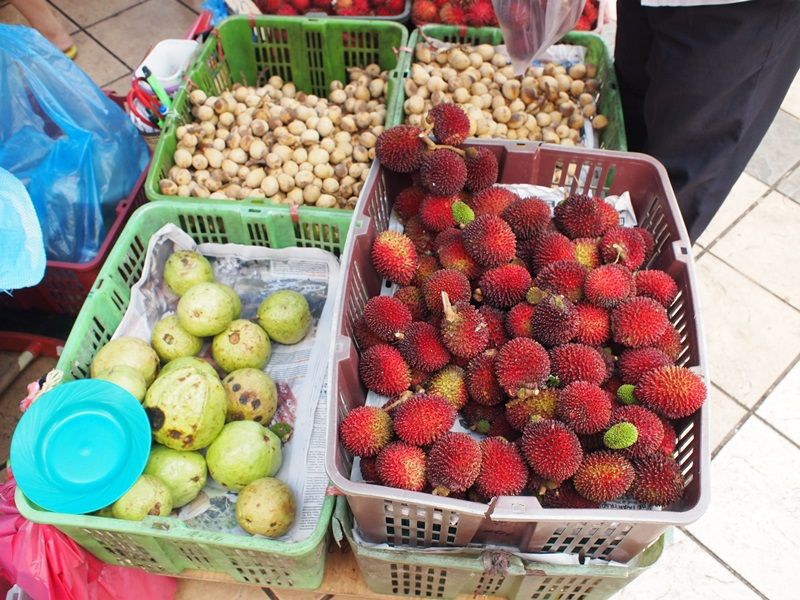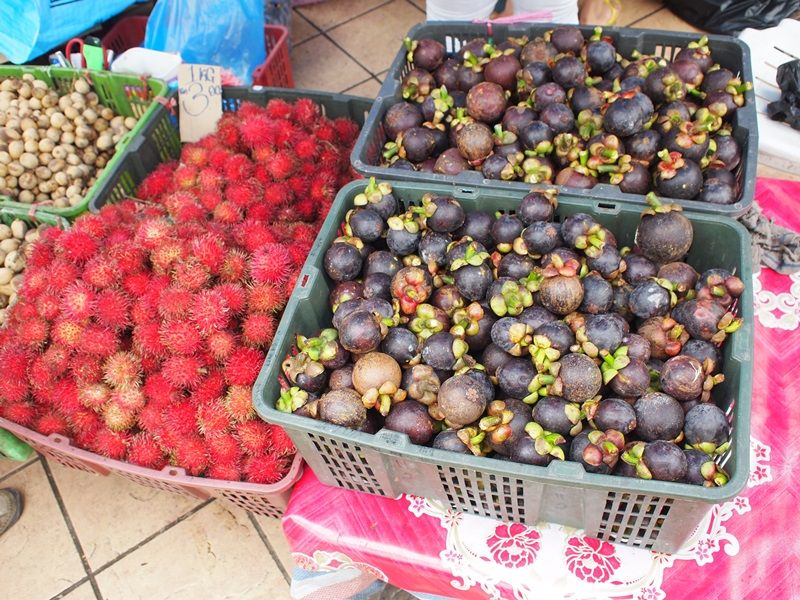My impression about Sibu back then has always been the wooden house where my grandmother used to stay, motorcycles, geese, mee suah (I called it Long Age Noodle, a direct translation from the actual Chinese word), kuih baulu (not sure if that's the word for it), Sugar Bun, Sarawak Plaza, milk ice-cream, and a few more nostalgia. The deepest nostalgia, will always be my very strict late grandmother, whom I always addressed her as Sibu Ama. But, sadly I can't speak Fu Zhou, as a result of that I've never really talk to her at all.
Since I'm a Sabahan, I will need to use a passport to enter into Sibu. Of course I can still enter into Sibu with IC, but may have to fill up some stuff I think. It now has a new airport, lesser motorcycles but a lot of cars. There are a lot of development since the last time I visited Sibu, but even so the uniqueness of Sibu is still retained, which I really like about: food.
The main town of Sibu is located near the riverbank of Sungai Rajang, the longest and widest river in Malaysia. Above is a picture of the shops and roads beside the riverbank. The pagoda in the picture is also the center of attraction in Sibu. I remember my dad used to take us there to see the whole Sibu town and to view the Rajang river from the top of the pagoda tower. There is not lift in the tower, we have to walk up the staircase.
Since the town is so near to the Rajang river, when there's high tide, Sibu will be affected by it. When I was there, I noticed a lot of places flooded with water, which according to those who've stayed there long enough, it is a norm. So how high the tide is? Well, take a look at the following pictures...
Some pictures of some part of the town near the riverbank. I used to remember the first time I came to Sibu, the Rajang river used to be red in color, but that was back in the 1980's. Now the river is really muddy and sad to say, polluted.
The other impression I have about Sibu is the speedboat, which is the only transportation medium to travel to the inner land of Sarawak where most of the indigenous people stay. I have been on the speedboat for once when I visited Sibu for the first time, and I could still remember that we actually stopped at some place along the river, and have something to drink in a coffee shop (the very old fashion coffee shop, neither Starbucks nor Old Town Coffee), and throwing tantrum because I didn't get the soft drink that I wanted (yes, shame on me).
Till this day, it is still the same. Even though there are a lot of development nowadays in Sibu, but there still isn't any development been done to build road for the small little town in the inner state to connect to the major town. This is the first hand information that I got because I knew a few of the indigenous people who still live in the inner state. Here are some of the pictures of the speedboat parked at the jetty that I've taken.
Here are some more pictures of Sibu that I've taken.
^ The corner coffee shop is where you could get a nice Kampua Noodle
^ The central market building
^ Even by the river you will get foggy weather
^ Opposite of the river from where I'm standing
^ Goose, symbol for Sibu? What's that over there? Sibu version of Marina Bay!?
So that's it for Sibu, the food will be introduced later. Now, about more than 1 hour drive away from Sibu, is a town called Sarikei. I don't really know much about this place because I have never really walk around in the place before. I was there because the driver would like to run some errand. At first we thought of having our dinner over there, but there wasn't any place that suit our appetite. So we decided to drive all the way back to Sibu instead. Some pictures of some part of Sarikei that I've taken.
^ Sugar Bun!!! Used to go crazy for it because back then there was no McDonald
The major thing for me will still be the noodle. Yes I like noodle very much, and that's why it's very hard for me to live in Kuala Lumpur because there isn't any good noodle meal to eat. So the famous one will still be the Kampua noodle, which is basically just noodle mixed with either soya sauce, or with sesame oil (if not mistaken). The other one would be the wet fried noodle, which is basically the noodle to be fried first and then mixed with some sauce (not Cantonese style), similar to the one that I always have in Sabah. But what's the fuzz over the noodle? The reason is because the noodle over here taste a lot better, and the texture is a lot better as compare to the one in KL. It could be because the noodle consumption is very high in Sibu, henceforth the noodle are mostly freshly made? Well at least I know in Tawau most of the noodle sellers made their own noodle. Frankly, for noodle, if the tradition is still continue in Tawau, I'd say noodle in Tawau is still the best :p. However, there's an advantage of eating in Sibu as compare to Tawau, which I'll save it for later.
Sadly I thought I have taken pictures of the noodle that I ate, but it was neither in my smarty phone nor my digital camera. However, I did took the following pictures.
Now, this is Chicken Soup Mee Suah. It is basically mee suah (another type of noodle) in chicken soup, with at least 2 pieces of chicken meat. The chicken soup is basically a herbal soup cook with chicken, it is good for health. I still remember my dad used to cook this for us, which I really like. This is a Fu Zhou dish, and I could still remember that my late grandmother would cook this for us when we arrived Sibu, and then will cook it again with more ingredients for us to eat before we leave Sibu. Apparently this is a Fu Zhou tradition. Have I done the same thing when I was there? Yes I did. I ate one on the 2nd day in Sibu, and then I have another one in the morning on the day I leave Sibu.
The other unique meal that I have for the first time is a dish called Din Tien Hu, which is basically starch noodle made with rice flour and teared in pieces, cook together with soup. But sadly due to my nature of not asking what are the ingredients (as sometimes after knowing what is the ingredient, I may stop eating it for the rest of my life no matter how good it is...) so I don't really know what are the ingredients used to cook the soup. It is something look like the following pictures.
It is nice to eat; clear, not too strong in taste, just nice. Apparently the shop has been there for a long time, and it is a family business, and is still in the same old place where it is not noticable, with same old fashion coffee shop style, haaa... How enjoyable (honestly when I was kid I don't appreciate this kind of place :p). Only the local would know about the place. Then the other thing that I used to have, would be a soda drink, local made.
It tastes like ice-cream soda. This is something new to me as well as I didn't know that Sibu has such a drink. I know that there's a milk ice-cream in Sibu, which is locally made as well, but I haven't have a chance to eat it while I was there. Of course, not to mention that there are Kompia (a type of bake bun), and also Kuih Paulu (not sure if that's the name), which are all local bakery stuff that still exist until now, which is a good sight.
Now as for the price? Well, the mee suah that I've shown above, the portion is good enough to fill me up, and it costs only RM4. The normal Kampua noodle will not cost more than RM3, so it is consider very affordable, therefore although the noodle in Tawau is nicer, but the price is really way too high as compare to Sibu if comparing ingredient to ingredient. Even all the bake stuff that I've mentioned earlier, they are all selling at a very cheap prices where you could actually buy in bulk. So next time, I'll know what to do if I'm going to visit Sibu again; fast for few days, save up the money, and eat all I can over there :p.
Apart from the food, here are some treats to the fruit lovers.
^ The local Durian Kampung
^ Buah Tapai & some Rambutan
^ Guava, Langsat, and another un-identify fruit
^ Mangosteen & Rambutan
So for local fruit lovers, at the Central Market of Sibu, there is a corner where there will be a lot of people bringing their harvest to sell it there. There are Durian, Mangosteen, Langsat, Rambutan, Guava, and Buah Tapai. I've never heard of Buah Tapai before, and only get to know about it during the visit. Buah Tapai is quite unique because it has to be soaked in lukewarm water to have it expand before it is consumed. I personally don't like to eat local fruit (yes, shame on me), so I don't know much about them, and I don't buy a lot of them either. Frankly in my father's plantation in Tawau, he has planted Rambutan, Langsat and Durian, thus our family can eat these fruits for free, so my family quite fortunate, except for me because I don't appreciate them, shame... The Durian in my father's plantation, the seed is brought from Sibu as well. The price for the fruits seems to be reasonable. Most of the sellers are indigenous people, and most of them are actually staying in the inner state, where they have to travel by speedboat for more than 1 hour to sell their harvest in Sibu, which can be considered as a tough life. Imagine traveling on the speedboat for more than 1 hour, if strong enough maybe able to survive the motion sickness, but during high tide as well!?? I don't think I can stand that...
Final thought
Well, I am really grateful again that I could come to visit Sibu. Sibu to me, although there are a lot of development going around, but the essence of Sibu is still remain; it's like its identity is still there, and it's not just simply to follow the trend, but it's like it will absorb what is good and use it to enhance it's own identity kind of feel. I really like that.
And this trip has let me to realize that I should embrace some good tradition, i.e. the mee suah. I didn't know what it means when I was young, even now I don't know what is the significant meaning behind it, but somehow rather I felt that it is of good intention. Mee suah has another name called Long Life noodle, so it could mean that having a bowl of it when arrived home means thankful that you're able to live until now and back home with the family, and then having another bowl before leaving means may it be that you'll be able to come back again. Now it may seems irrelevant nowadays, but last time, there are no internet, no handphone, and not everyone can afford a telephone line either, all done via hand writing letter.
So with this, will I embrace it in the future? Yes I will. I will embrace it to identify that I am a Fu Zhou, and I am born as a Fu Zhou for a reason. I always ponder about this where there's a saying said a lot of things have been deemed as old fashion therefore no one is doing it anymore, but I would think otherwise, because by simply following the latest trend and just blindly accepting what is good because everybody say is good and it's fun, and slowly forgetting our own tradition, there will be a lot of good and valuable things become extinct. The reason can be because we have not been taught of the meaning of all these good traditions, and thus we will not appreciate it and instead will just ignore it.
As I grow older and understand certain thing, I really thank God for teaching me this, where it is very important not to forget my root, my origin. I'm a Fu Zhou for a reason, and as far as I know Fu Zhou people are very hardworking and also willing to take risk. There's something about Fu Zhou people that I could learn from. I'm grateful that even though when I was a kid, I don't really appreciate being a Fu Zhou, but now I do, and I'll embrace the good tradition and the strong point of a Fu Zhou.
Well, that's it for another short and rushing trip, till next time!!!


